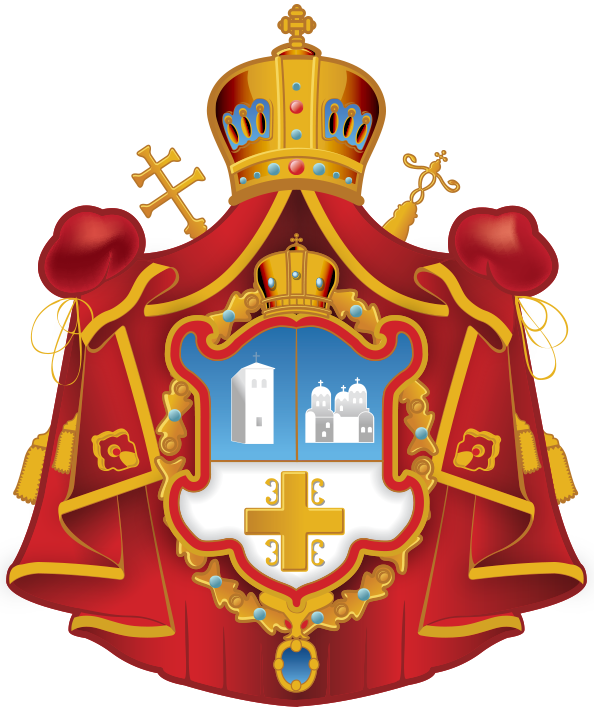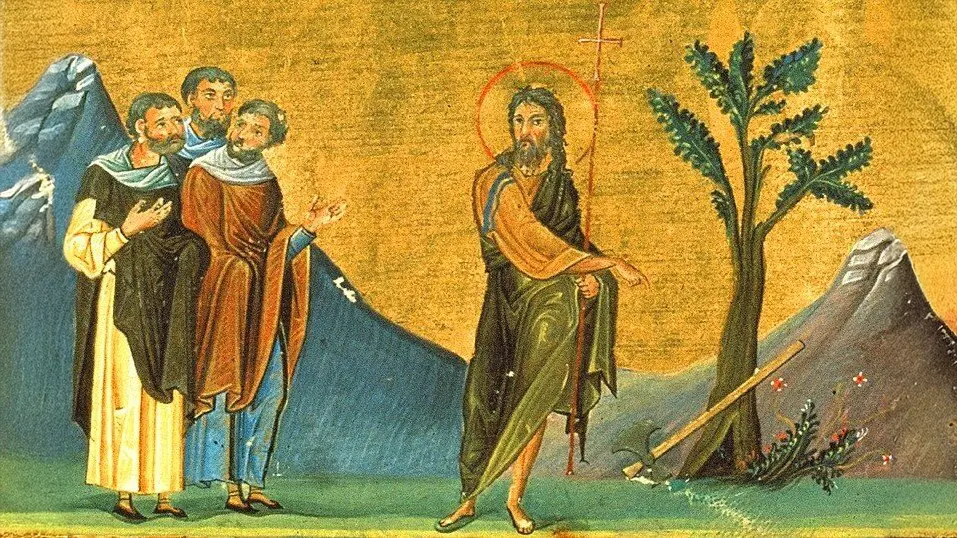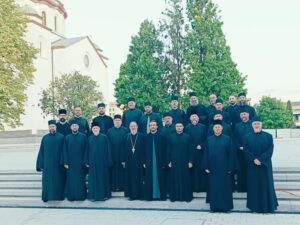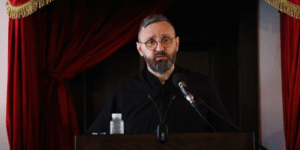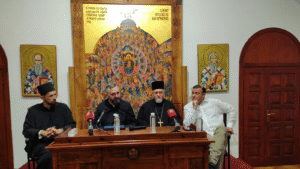“And now also the axe is laid unto the root of the trees: therefore every tree which bringeth not forth good fruit is hewn down, and cast into the fire.”
The Church Fathers teach that one must live a spiritual life continuously. Blessed Theophylact comments that the Holy Forerunner “did not say, ‘which has not borne,’ but rather ‘which does not bear,’ for we must always be bringing forth fruits of virtue. If you gave alms yesterday and today you plunder, you have not pleased God.” The saints interpret the axe as the power of the divine word and explain this in a very compelling way. Thus, Saint Chromatius of Aquileia explains that the word of God is the axe, which stands at the inner root of faith in the forest of the human race and cuts down every barren tree, that is, every person who refuses to live with God.
For his part, Saint John Chrysostom addresses the common dilemma people face regarding the tension between divine predestination and human free will. In interpreting this verse, he touches upon the notion that salvation depends on our choice, on man’s freedom and decision to live with God or not. These are Chrysostom’s words: “Since prophecies were often fulfilled only after many years, in order to deprive them of such comfort, John threatens them with imminent calamities, expressed in the words: ‘now,’ and added to that: ‘unto the root.’ There is no distance, he says, the axe lies right at the root. He does not say: ‘at the branches,’ but at the root, to teach them that if they persist in idleness, they will be subjected to unavoidable misfortunes, with no hope of deliverance. And this is because, he says, the One Who is coming is no longer a servant like those who came before, but the Lord of all, in Whose hands is dreadful and terrifying judgment. Yet, having frightened them in this way, he does not allow them to fall into despair. Just as earlier he did not say that God ‘has already raised up’ children to Abraham, but that He ‘can’ raise up children from these stones—to both frighten and encourage them—so here he does not say that the axe has already struck the root, but that it stands at the root, close to it—thus excluding any delay. But although it is so near, the cutting is left to your will. If you repent and improve, the axe will be withdrawn from the root, doing it no harm. If you continue as before, the axe will not delay to cut down the tree at the root. This is why it remains at the root, not yet cutting, so that you do not become negligent, but also so that you understand there is still time, and that salvation is possible—even quickly—if you repent.”
Here is also an ascetic interpretation of these words, which is very important for our spiritual life. St. Ignatius Brianchaninov writes: “The venerable Agathon, a monk of the Egyptian Skete, when asked what was more important, bodily or inner asceticism, replied: ‘A man is like a tree; bodily asceticism is like the leaves of a tree, and the inner life is its fruit. But since it is written in Holy Scripture, every tree that does not bear good fruit is cut down and cast into the fire (Luke 3:9), it is clear that our entire concern should be for the fruit, that is, for guarding the mind. It is also necessary that the tree be covered and adorned with leaves, which represents bodily asceticism.’ ‘O wonder!’ exclaims the blessed Nikephoros of Mount Athos, who quotes the words of the venerable Agathon in his work on spiritual struggle. ‘What a saying this saint has spoken against all who do not guard the mind, but rely solely on bodily discipline! Every tree that does not bear good fruit (i.e., guarding of the mind), but only has leaves, i.e., bodily labours, is cut down and cast into the fire. Your saying, O Father, is dreadful indeed!’”
Let us continue with the next, 11th verse.
“I indeed baptize you with water unto repentance; but He that cometh after me is mightier than I, whose shoes I am not worthy to bear: He shall baptize you with the Holy Ghost, and with fire.”
Saint John Chrysostom masterfully highlights the consistency in the words of Saint John the Forerunner, showing how the Forerunner guided the souls of those who listened to him and removed any possible misconceptions about Christ, whom he preached. These are Chrysostom’s words: “John did not immediately say, ‘I am not worthy to carry His sandals’; rather, he first demonstrated the inadequacy of his own baptism, which could do nothing more than lead them to repentance (thus he did not say: with water for the remission of sins, but for repentance). Then he speaks of Christ’s baptism, overflowing with inexpressible gifts. So that you, hearing that He comes after me, would not begin to despise Him as one who comes later—understand the power of His gift, and you will clearly see that I have said nothing excessive, not even enough, when I said: I am not worthy to carry His sandals. Therefore, when you hear that He is mightier than I, do not think I spoke merely by comparison; I am not even worthy to be among His servants, not even among the lowest, not even to perform the most menial service for Him… Then, so that you would not think this was said out of humility, he offers as proof the deeds themselves: He shall baptize you with the Holy Spirit and with fire. See the wisdom of the Forerunner! When he preaches himself, he speaks fearfully and with dread; but when he sends people to Christ, he speaks gently and comfortingly. He no longer speaks of axes, of trees being cut down and thrown into the fire, or of the wrath to come, but points to the remission of sins, the removal of punishment, justification, sanctification, redemption, adoption, brotherhood, inheritance, and the abundant outpouring of the Holy Spirit. He understood all of this under the words: He shall baptize you with the Holy Spirit, expressing with this phrase the abundant pouring out of grace. He did not say, ‘He will give you the Holy Spirit,’ but He shall baptize you with the Holy Spirit; and by adding the words: and with fire, he further emphasized the power and the active force of this grace.”
Saint Ignatius Brianchaninov pointed to the Holy Forerunner as a model in discerning true spiritual guides, in the sense that true shepherds of souls always follow the example of the Forerunner and always point to Christ, not to themselves; they always strive to diminish themselves in the eyes of those they guide and to glorify Christ. And here, in the words of Saint John Chrysostom, we see that the Holy Forerunner, like all true shepherds of souls, points solely and exclusively to Christ, not to himself. Saint John of Kronstadt, for his part, highlights the great humility of the Forerunner in the words I am not worthy to carry His sandals and says that only the righteous, who understand Christ’s greatness more than all of us, can truly be in awe before His glory, whereas the rest of us only occasionally glimpse His greatness, for we lack the fear of God in its fullness.
Some Islamic theologians, referencing these words of the Forerunner, claim that he is not speaking of Jesus at all, for how could he refer to Him as the One coming after him, if Jesus and the Forerunner were born at nearly the same time? They use these words to argue that the Forerunner was supposedly referring to Muhammad. This misconception can be clearly refuted by reading the words of the Gospel of John (1:26–27): “John answered them, saying: I baptize with water, but there standeth one among you, whom ye know not. He it is, who coming after me is preferred before me.” Through the phrase there standeth one among you it becomes perfectly clear whom John has in mind—whether his contemporary, the Lord Jesus Christ, or Muhammad, who was born six centuries later.
I now proceed to verse 12.
“Whose fan is in His hand, and He will thoroughly purge His floor, and gather His wheat into the garner; but He will burn up the chaff with unquenchable fire.”
Blessed Theophylact offers a response to one of the temptations that may arise at a certain point in spiritual life—that since we are already within the Church, even if we knowingly commit sin, the Lord will forgive us because, after all, we are in the Church. He writes: “Do not think that He will forgive you if you continue to sin after receiving baptism from Him. Rather, know that the winnowing fan—that is, judgment and discernment—is in His hand. He will thoroughly cleanse His threshing floor—the Church—in which many of the baptized are like wheat upon the threshing floor. However, some of the baptized are frivolous like chaff, blown by evil spirits like the wind, while others are like wheat and provide benefit to others through teaching and virtuous deeds. He shall gather His wheat into the storehouse, but the chaff He shall burn with unquenchable fire. That fire is indeed unquenchable. Therefore, Origen speaks falsely when he claims that hellish torment will eventually come to an end.”
Saint John Chrysostom, for his part, points to the terms “chaff” and “wheat” and connects them to the inner qualities of people, highlighting the essential difference that separates the one from the other. He writes: “Let no one be chaff, let no one be so light as to be carried away by the wind or so given over to bad habits as to be dragged about by them. If you are wheat, even should you face temptation, you will suffer no harm—for on the threshing floor the gears do not crush the wheat. But if you mingle with weak straw, you will suffer unbearable afflictions here, for all will trample you, and there, eternal punishment will follow. Indeed, such people, even before the fiery furnace of the life to come, already become food for irrational passions, just as straw is fodder for irrational animals—and there, too, they shall be fuel and material for the fire.”
The next verse, verse 13, reads:
“Then cometh Jesus from Galilee to Jordan unto John, to be baptized of him.”
Saint John Chrysostom writes: “Then cometh Jesus. When? When He had reached full maturity; when He had climbed the entire ladder of human growth; when the perfection of His body and soul had shone forth; when, over thirty years, He had become the perfect man.” It must be emphasized that Saint John is not claiming that the man Jesus only became perfect when the Son of God descended upon Him at the Jordan—as the heretic Nestorius falsely taught—but rather that, in the Old Testament, the age of thirty was considered the threshold of maturity. This is why the Lord waited to reach that age in order to begin preaching and teaching. We see that the Evangelist Matthew emphasizes the origin of Jesus—He comes from Galilee, and according to the testimony of Mark, more precisely, from Nazareth of Galilee (Mk. 1:9). Therefore, the Lord Jesus spent the first thirty years of His earthly life in complete silence. He remained in Nazareth for the most part, having only briefly been in Bethlehem and Egypt. The rest of the time He lived in Nazareth, in complete humility, and from the canonical Gospels we know nothing more about that period of His life except the episode in the Gospel of Luke, when at twelve years old He was found in the temple by the Virgin Theotokos and Joseph after three days. This simply means that nothing essential for our salvation occurred during that time, and we should not be overly curious about the childhood of the Lord Jesus. It is precisely this curiosity that apocryphal texts exploit, fabricating stories and details about Jesus’ early years and portraying Him in ways entirely foreign to what we know of Him from the four divinely inspired Gospels. We find indirect confirmation that He did not travel beyond Judea in the very reaction of the people of Nazareth when He began preaching there. Their reaction is recorded in the following verse: “Is not this the carpenter, the son of Mary, the brother of James and Joses and Judas and Simon? Are not his sisters here with us?” And they were offended at Him (Mk. 6:3). They were astonished because in such a small town as Nazareth, everyone knows everyone else—which remains true in small communities even today. And in all the thirty years He lived among them, they saw nothing unusual in Him or in His life.
Adapted and presented for contemporary readers based on Patristic commentaries: Stanoje Stanković.
